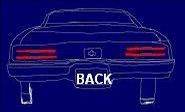| Spark
knock (detonation) is caused when the fuel-air mixture in the combustion
chamber burns ahead of the advancing flame front. Once the spark
plug ignites the fuel-air mixture, the flame consumes the mixture,
increasing the heat and pressure in the combustion chamber. As the
piston compresses the burning charge even further, the unburned
fuels auto-ignition temperature is reached, and detonation occurs.
Engine design, fuel rating, and operating variables affect the engine
spark knock performance. Different engine designs have been found
to increase knock resistance. Centered spark plugs, lower compression,
a swirling of the fuel-air mixture in the cylinder, and two spark
plugs per cylinder have been found to decrease spark knock. Increased
compression, off centered spark plugs and a slow-burn combustion
chamber increase spark knock. Engine operating variables also influence
spark knock. Spark timing, coolant temperature, and air-fuel ratio,
outside air temperature, and humidity, are an important part of
the equation. |

